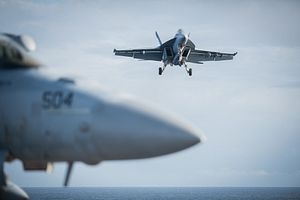Last week, U.S. President Barack Obama signed into the law the National Defense Authorization Act (NDAA) for Fiscal 2017. The law highlights priorities for defense spending with congressional assent, but does not enact budgetary appropriations, which will likely come early in the spring of 2017.
Though most headlines focused on the bill’s $611 billion total spending authorization for U.S. defense spending and other provisions related to personnel pay, the law contained a new provision on U.S. defense ties with Taiwan that drew attention in both Taipei and Beijing.
Section 1284 of the law, which addresses non-binding congressional recommendations on U.S.-Taiwan relations, includes language calling for “military exchanges between senior officers and officials of the United States and Taiwan.”
“The Secretary of Defense should carry out a program of exchanges of senior military officers and senior officials between the United States and Taiwan designed to improve military to military relations between the United States and Taiwan,” the bill adds.
According to the law, the military “exchanges” are defined as “an activity, exercise, event, or observation opportunity between members of the Armed Forces and officials of the Department of Defense, on the one hand, and armed forces personnel and officials of Taiwan, on the other hand.”
The inclusion of this provision — though unbinding — presents an opportunity for the incoming administration of Donald Trump to materially advance U.S.-Taiwan defense cooperation.
Early in the presidential transition, the incoming administration gave off a strong signal that it would focus on enhancing U.S. ties with Taiwan. Trump’s early December phone call with Taiwanese President Tsai Ing-wen included discussions on “the need to promote domestic economic development and strengthen national defense so that citizens can enjoy better lives and increased security,” according to the Taiwanese readout of the call.
Asked about the provision in the U.S. NDAA for 2017, Hua Chunying, a spokesperson for the Chinese Ministry of Foreign Affairs, noted that China was “firmly against the Taiwan-related contents in the U.S. act and have lodged solemn representations with the U.S.”
“We are strongly discontent with the U.S. for signing this act,” Hua added. Notably, the Chinese Foreign Ministry did not directly blame Trump in the aftermath of the phone call with Tsai, instead choosing to condemn the Taiwanese president for a “little trick.”
“We urge the U.S. side to honor its commitment on the Taiwan question, put an end to military exchanges with and arms sales to Taiwan and avoid undermining China-U.S. relations or cross-Straits peace and stability,” Hua added on the NDAA.
The United States does not maintain formal diplomatic ties with Taiwan under its ‘One China’ policy, which recognizes the government in Beijing instead. De facto diplomatic relations between the United States and Taiwan are governed under the Taiwan Relations Act.
Taiwan is not a U.S. treaty ally and the United States does not guarantee its unconditional defense against outside aggression.

































